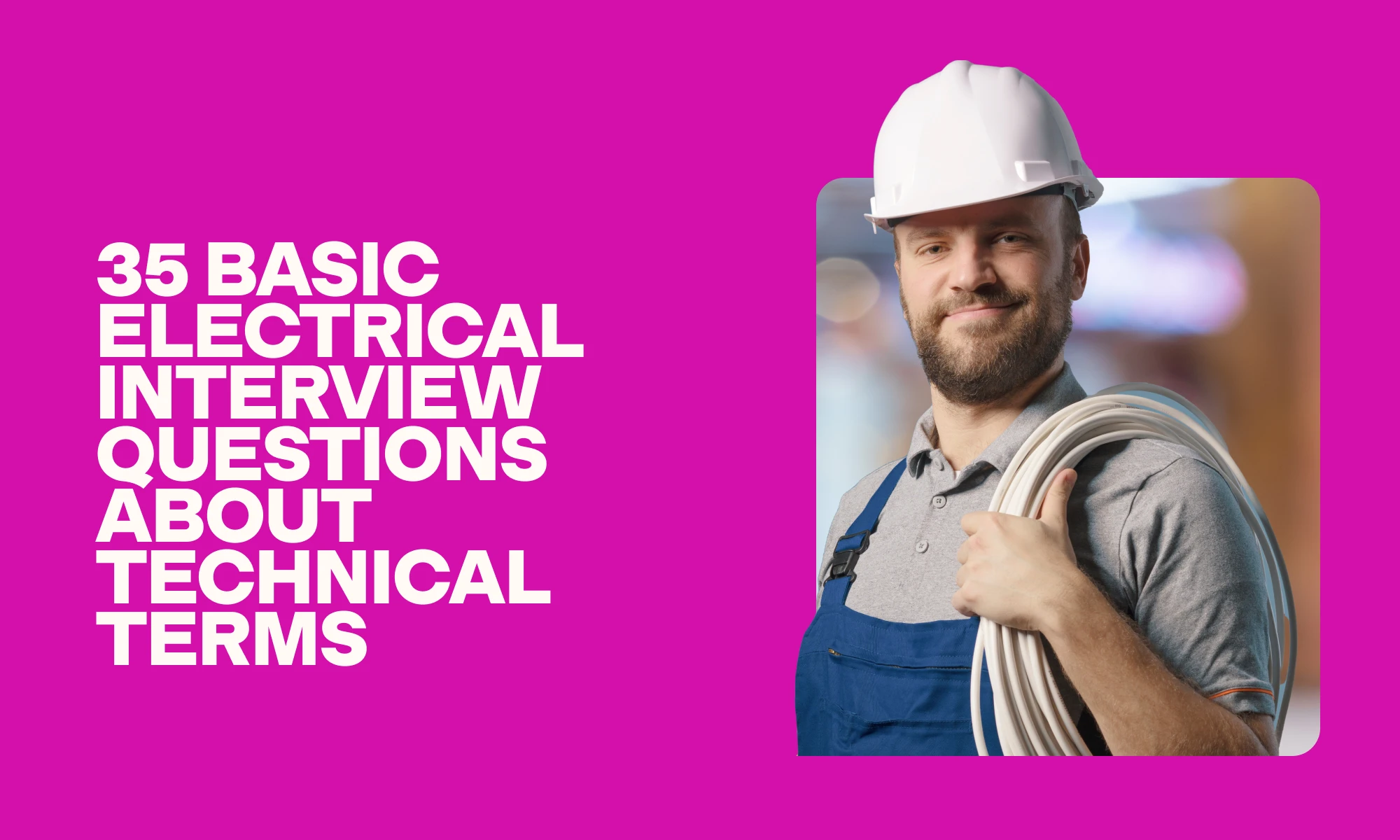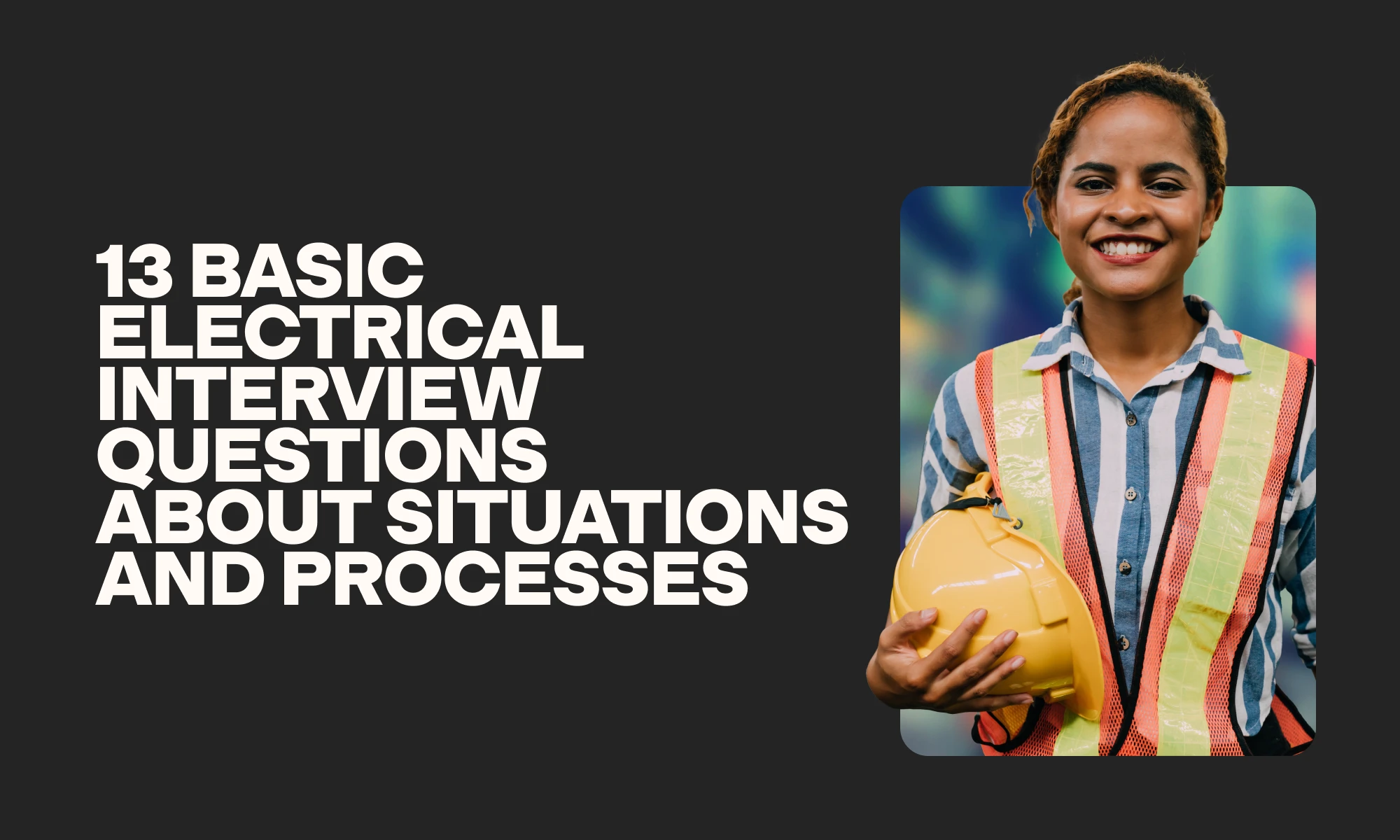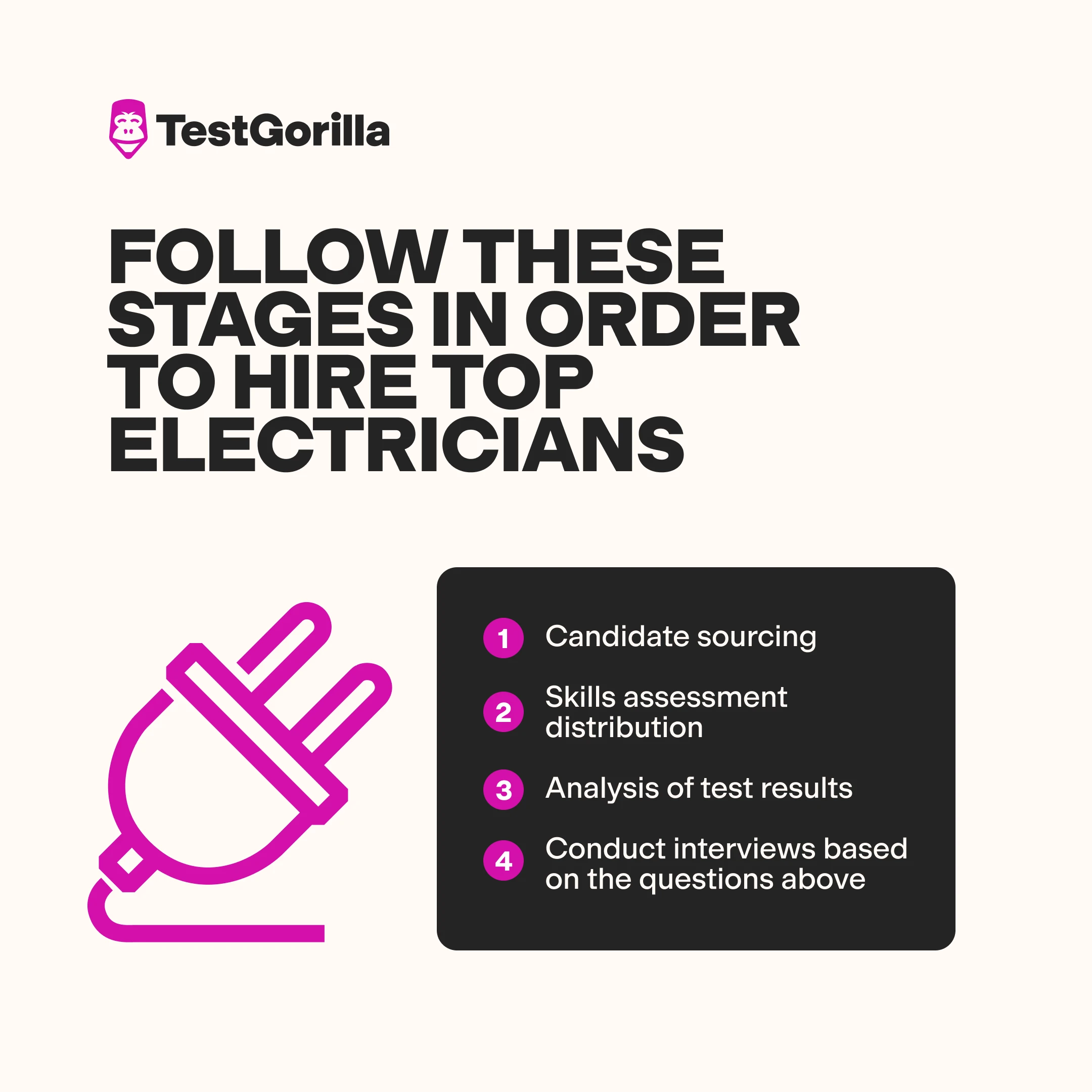60 basic electrical interview questions to hire capable electricians
Find the best electricians with online skills testing
Does your business need a new electrician to complete tasks and pick up the slack?
Here’s one thing to consider: Your hiring process must account for the complex task of assessing electricians’ technical and soft skills.
Are you considering how to best evaluate your applicants’ skills? Do you know how to assess their knowledge of the fundamentals of electricity?
Skill testing and interviewing applicants is a proven combination for hiring skilled electricians. Using the right electrical interview questions during the interview can help you get the correct information from your applicants.
If you haven’t yet decided on the right interview questions to ask, you’re at the right place.
In this article, you’ll find a list of basic electrical interview questions to help you prepare for interviews with candidates.
Table of contents
- 12 general electrical interview questions to ask applicants
- 5 general electrical interview questions and answers
- 35 basic electrical interview questions about technical terms to ask your interviewees
- 5 basic electrical interview questions and answers about technical phrases
- 13 basic electrical interview questions about situations and processes
- 5 basic electrical interview questions and answers about situations and processes
- Should you use structured or unstructured interviews to hire electricians?
- Why is skills testing vital when hiring electricians?
- At which stage of the recruitment process should you interview candidates?
- Get to know your candidates using our basic electrical interview questions
12 general electrical interview questions to ask applicants
Ask electricians some of these 12 basic electrical interview questions to discover more about their general experience, career, and electrical knowledge.
Explain what electric traction means.
Name the two main types of electricity.
Which skills are required to work as an electrician?
Name a few different methods to produce electricity.
Which soft skills are required to work as an electrician?
Which technical skills are you trying to hone now?
Explain two dangers of working with electricity.
Explain what heat does to an insulator.
Explain what moisture does to insulating materials.
Explain what heat does to resistance.
Describe the primary responsibilities of an electrician.
Describe your electrician career and knowledge.
5 general electrical interview questions and answers
We’ve selected five of the most important general electrical interview questions to ask potential new hires and provided sample answers to help you judge their knowledge and ambition.
1. Which soft skills are required to work as an electrician?
Candidates for an electrician role should understand that soft skills are also essential for their job.
Can they explain that communication with clients, attention to detail when completing jobs, and time-management skills ensure that an electrician completes their work efficiently?
2. Which technical skills are you trying to hone now?
Your applicants may be trying to learn various new technical skills. They may want to develop their digital-logic-design skills or knowledge of electronic circuits. Regardless of the specific skill, pay attention to their methods to improve them and consider whether they are proactive about their professional development.
3. Which skills are required to work as an electrician?
Candidates just beginning their electrician careers should know that many fundamentals of electricity sub-skills are essential to work as an electrician.
Do they know that basic electrical knowledge, electric power skills, and knowledge of electronic circuits are all vital for electricians?
Discover how we can help you find the best candidates
Book a free live demo with us and find out how online skills testing can streamline your hiring process.
4. Explain two dangers of working with electricity.
Candidates with basic electrical abilities should be able to name two of the dangers of working with electricity, such as physiological hazards and chemical risks.
Can your applicants explain that physiological threats include electric shocks and that chemical hazards are often caused by charging batteries or electroplating?
5. Name a few different methods to produce electricity.
How familiar are your applicants with the many methods used to produce electricity?
When answering this basic electrical interview question, candidates may list the following methods: batteries (chemical action), generators (mechanical driving), by using heat (thermal energy), or by using friction.
The best insights on HR and recruitment, delivered to your inbox.
Biweekly updates. No spam. Unsubscribe any time.
35 basic electrical interview questions about technical terms to ask your interviewees
Interview your candidates using some of these 35 questions about technical terms and definitions to learn about your applicants’ theoretical knowledge.
Explain what static electricity is.
Explain what current electricity is.
Name the two types of electrical current.
Name the primary sources of electricity.
List the main types of electricity applications.
Explain what A.C. means.
Explain what D.C. means.
Explain what conductors are.
Explain what insulators are.
Name five materials electricians use as conductors.
Name five materials electricians use as insulators.
Define what dielectric strength means.
Name five vital properties of a good conductor.
Name five essential properties of a good insulator.
Explain what a semiconductor is.
Name two main types of semiconductors.
Explain what resistance is.
Explain the main classifications of resistance.
Which unit is used to measure resistance?
Explain what a resistor is.
Which factors affect a conductor’s resistance?
Explain Ohm’s law.
Explain what capacitance means.
Explain what inductance means.
Explain what a generator is.
Explain what an alternator is.
Name the five colors used for electrical wires.
Explain the properties of the black wire in electrical circuits.
Explain the properties of the red wire in electrical circuits.
Explain the properties of the blue and yellow wire in electrical circuits.
Explain the properties of the white and grey wire in electrical circuits.
Explain the properties of the green wire in electrical circuits.
Explain what an RLC circuit is.
Explain what the American Wire Gauge system is.
Explain what a Zener diode is.
5 basic electrical interview questions and answers about technical phrases
Use the answers to the five most important basic electrical interview questions about technical terms below to understand your applicants’ skills better.
1. Explain the properties of the black wire in electrical circuits.
Can your applicants explain that the black wire in electrical circuits is for the power supply? Can they explain that a circuit with a wire of this color is also live? Applicants should know that electricians never use black-colored wires for ground or neutral wires.
2. Explain the properties of the red wire in electrical circuits.
Are your applicants aware that the red wire in electrical circuits is a secondary live wire that electricians use in 220-volt circuits? Do they know that electricians also use red-colored wires for interconnections and that they can be joined with black or other red wires?
3. Explain the properties of the blue and yellow wire in electrical circuits.
Do your candidates know that the blue and yellow wires can carry electrical power but do not count as wiring for common electrical devices that plug in? Are they aware that electricians can use blue and yellow wires for switched outlets?
4. Explain the properties of the white and grey wire in electrical circuits.
Your applicants should know that electricians use white and grey wires as neutral wires. Do they know that electricians can only join white and grey wires to other white and grey wires? Can they explain that white and grey wires carry an unbalanced load of current to the ground?
5. Explain the properties of the green wire in electrical circuits.
Can your applicants explain that electricians connect green wires to grounding terminals in outlet boxes? Are they aware that green wires travel between an outlet box to a ground bus bar in an electric panel?
13 basic electrical interview questions about situations and processes
Use the following 13 basic electrical interview questions about situations and processes below to see whether your candidates have the necessary knowledge for your role.
In which situations is D.C. used?
In which situations is A.C. used?
Which method would you use to determine if an electrical supply is A.C. or D.C.?
Explain the main factors that affect dielectric strength.
In which situations would you use semiconductors?
Explain the effect of two positively charged materials placed alongside each other.
Which method would you use to fix reverse polarity?
Which method would you use to determine the appropriately sized electrical wire?
In which situation would you use a 3-phase supply?
How would you decide whether to use 3-phase or 4-phase supply?
When do electricians use low tension cables?
When do electricians use high tension cables?
When do electricians use super tension cables?
5 basic electrical interview questions and answers about situations and processes
Use the answers below to five of the basic electrical interview questions about situations and processes to evaluate your applicants’ knowledge.
1. Explain the effect of two positively charged materials placed alongside each other.
Electricians starting their careers should understand that two positively charged materials placed alongside each other will repel each other. They may also explain that two negatively charged materials will repel each other and that opposite charges will attract.
Discover the benefits of online pre-employment testing
Sign up for your free plan and see how quick and easy it is to create a skills assessment.
2. Which method would you use to determine the appropriately sized electrical wire?
Your interviewees should know that using the American Wire Gauge system is one method to determine which sized electrical wire is the appropriate choice.
They may mention that if the wire gauge number is large, the wire’s diameter and thickness are small. If the wire gauge number is low, this indicates a larger-sized wire that electricians can use to conduct more electricity.
3. When do electricians use low-tension cables?
Applicants applying for electrician roles should know that electricians can use low-tension cables when the maximum voltage is below 1,000 volts. This is because low-tension transmits a maximum voltage of 1,000 volts, which relates to the thermal capacity of the cables.
4. When do electricians use high tension cables?
Candidates should recognize that in relation to the thermal capacity of the high-tension cables, electricians can use them in situations where the maximum voltage is below 23,000 volts. This is because these cables can transmit a maximum voltage of 23,000 volts.
5. When do electricians use super tension cables?
Can your applicants explain that electricians can use super tension cables when the maximum voltage is below 132 kV? This is because super tension cables transmit a maximum voltage of 132 kV.
Should you use structured or unstructured interviews to hire electricians?
There are several reasons using unstructured to hire electricians is a problematic option. Not only will you find it challenging to evaluate and compare your electricians’ responses, but you’ll also risk making a decision that has been influenced by unconscious bias.
Using unstructured interviews gives you the extra challenge of trying to record notes for all candidates in a structured way. Then, when you need to refer back to any notes, you’ll notice that the unstructured approach gives you more work to review candidates.
In terms of unconscious bias, this can filter into your hiring decisions as a result of unstructured interviews that may seem like an informal chat. For these reasons, we recommend using structured interviews.
Structured interviews enable you to:
Evaluate candidates’ knowledge and skills in a more objective way
Easily compare candidates
Reduce hiring bias by eliminating small talk and concentrating on candidates’ answers
Enhance the fairness of the interview process
In combination with skills tests, structured interviews make for a well-rounded, objective hiring process that makes it substantially easier to make the right hiring decisions.
Why is skills testing vital when hiring electricians?
When hiring an electrician for your team, you need to ensure you have a method that enables you to assess their skills objectively and reliably.
Skills testing is exactly this: It’s an accurate candidate evaluation tool that is significantly faster and more dependable than resume screening.
If you’re a non-technical recruiter looking for a professional electrician, you can use expert-crafted skill tests, like the Fundamentals of Electricity test, to help you assess applicants’ technical skills.
Using skills tests means you can assess technical aptitude regardless of whether you are an expert in the given field.
At which stage of the recruitment process should you interview candidates?
Once you’ve received a few applications for your electrician open role, send candidates’ an invitation to complete a skills assessment featuring up to five tests.
Once the results are in, you’ll be able to identify the best applicants to invite to an interview for an additional assessment. This is when you should use the basic electrical interview questions from this article.
In short, the order you should follow when hiring electricians is the following:
Skill assessment distribution
Analysis of test results
Conducting interviews using the basic electrical interview questions above
This technique ensures you can thoroughly evaluate candidates’ knowledge and qualities and expedites the hiring process.
Get to know your candidates using our basic electrical interview questions
If thinking about the many skills you need to assess when hiring is giving you a headache, take a breath.
You’ve got skill testing and basic electrical interview questions at your disposal: You’ll see how much simpler it is to hire applicants using these two essential hiring tools.
Use skill tests before conducting interviews, and remember to include the Fundamentals of Electricity test in your skills assessment to see whether candidates have the necessary basic knowledge for the role.
Get to know your candidates using skill testing and the right interview questions – and hire the perfect match for your business.
With TestGorilla, you’ll find the recruitment process to be simpler, faster, and much more effective. Get started for free today and start making better hiring decisions, faster and bias-free.
You've scrolled this far
Why not try TestGorilla for free, and see what happens when you put skills first.
























